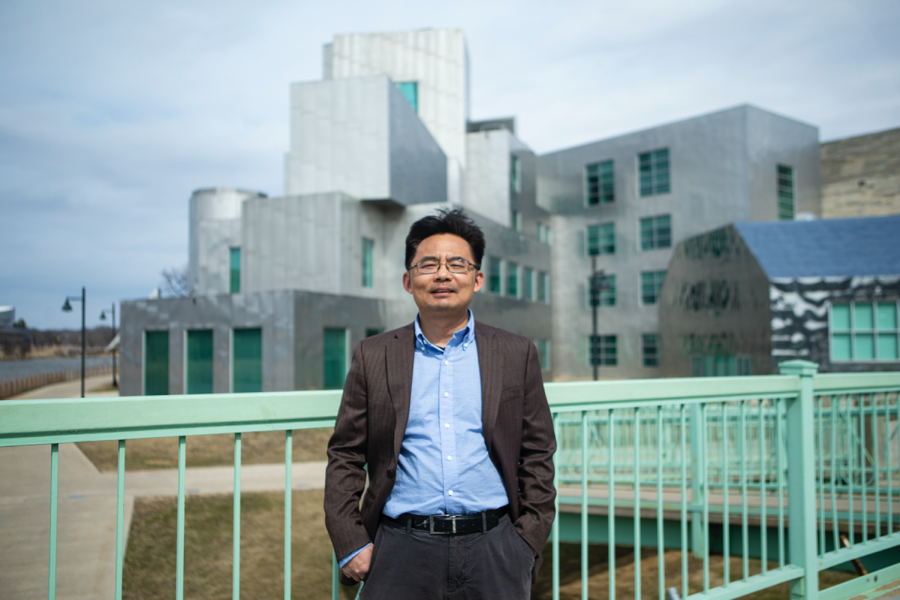UI researchers develop technology to promote sustainable farming
UI researchers will develop smart sensor technology in an attempt to improve agriculture.
University of Iowa engineering professor Jun Wang stands outside the Iowa Advanced Technology Laboratories on March 27.
March 31, 2019
A team of University of Iowa researchers has been awarded $1.6 million from the U.S. Agriculture Department to develop technology to improve soil temperature and moisture in farming areas.
UI chemical & biochemical Professor Jun Wang said the project is especially important to develop now in order to prepare for the future.
“If you think about agriculture in the 21st century, the project is going to be very important for two reasons,” he said. “On one hand, the world population is going to be doubled by 2050, but on the other hand, if you look back on our history in terms of crop yield, with time, it’s kind of linear. As times goes, the crop yield increases as a linear function.”
Wang described crop yield as very in increasing.
“You can imagine that by 2050, there is no way the food production can meet the demand from the population,” he said. “Unless we increase the crop yield dramatically.”
RELATED: New program through UI center seeks to end farming-related accidents
There are two ways to combat the problem, he said.
“We can turn the forests, prairie lands, and wetlands into agriculture lands, which wouldn’t be good for our next generation,” Wang said. “The only way I think is sustainable is to find ways to increase crop yield is by using the land we already have.”
In order to expand crop growth, the world needs to use technology to improve farming.
“We want the rural community to embrace new technology so they can benefit from it,” Wang said. “They’ll save their money by doing smarter farming.”
Many farmers currently use a “one size fits all” approach in maintaining crop yields, he said. The project aims to solve this.
“We are going to deploy about 500 sensors to measure temperature, humidity, soil moisture, and other things,” he said. “These sensors will then transfer information to the Cloud. Both observations and forecasts will be given to the farmers through an app to aid their irrigation scheduling and field practices.”
Farmers will then be able to know about their farmland in real time and what parts of the land need what to sustain crops, Wang said. The community will be updated during the process.
The project will begin in rural Nebraska because of farming practices that depend heavily on irrigation.
Xin Qiao, an assistant professor at the University of Nebraska, said the Nebraska project will allow researchers to develop more data for the benefit of farmers.
“It’s not limited to irrigation,” Qiao said. “It’s more of a platform. After this platform is established, we can develop sensors for other areas. It’s really a data collection that has unlimited potential in the long run.”
Chittaranjan Ray, the director of Nebraska Water Center at the University of Nebraska, said the proposed devices will be more available to farmers, because traditionally, they do not use much technology in their work.
“The farmers who do not deploy soil-water sensors in their fields or are not technology-savvy, do not have the means to irrigate in an efficient manner,” Ray said in an email to The Daily Iowan. “With the proposed technology that will be available on smart phones or web, it may motivate some farmers to irrigate using this approach.”






